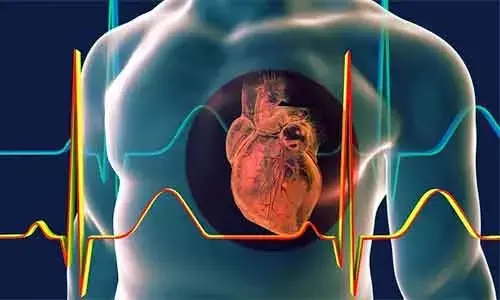- Home
- Medical news & Guidelines
- Anesthesiology
- Cardiology and CTVS
- Critical Care
- Dentistry
- Dermatology
- Diabetes and Endocrinology
- ENT
- Gastroenterology
- Medicine
- Nephrology
- Neurology
- Obstretics-Gynaecology
- Oncology
- Ophthalmology
- Orthopaedics
- Pediatrics-Neonatology
- Psychiatry
- Pulmonology
- Radiology
- Surgery
- Urology
- Laboratory Medicine
- Diet
- Nursing
- Paramedical
- Physiotherapy
- Health news
- Fact Check
- Bone Health Fact Check
- Brain Health Fact Check
- Cancer Related Fact Check
- Child Care Fact Check
- Dental and oral health fact check
- Diabetes and metabolic health fact check
- Diet and Nutrition Fact Check
- Eye and ENT Care Fact Check
- Fitness fact check
- Gut health fact check
- Heart health fact check
- Kidney health fact check
- Medical education fact check
- Men's health fact check
- Respiratory fact check
- Skin and hair care fact check
- Vaccine and Immunization fact check
- Women's health fact check
- AYUSH
- State News
- Andaman and Nicobar Islands
- Andhra Pradesh
- Arunachal Pradesh
- Assam
- Bihar
- Chandigarh
- Chattisgarh
- Dadra and Nagar Haveli
- Daman and Diu
- Delhi
- Goa
- Gujarat
- Haryana
- Himachal Pradesh
- Jammu & Kashmir
- Jharkhand
- Karnataka
- Kerala
- Ladakh
- Lakshadweep
- Madhya Pradesh
- Maharashtra
- Manipur
- Meghalaya
- Mizoram
- Nagaland
- Odisha
- Puducherry
- Punjab
- Rajasthan
- Sikkim
- Tamil Nadu
- Telangana
- Tripura
- Uttar Pradesh
- Uttrakhand
- West Bengal
- Medical Education
- Industry
New medication may treat underlying causes of hypertrophic cardiomyopathy

DALLAS - The new, investigational heart medication mavacamten may improve key structural abnormalities of obstructive hypertrophic cardiomyopathy, a condition characterized by thickened heart muscle that obstructs pumping of blood through the heart, according to research from the Phase 3 EXPLORER-HCM trial, to be presented at the American Heart Association's Scientific Sessions 2020. The meeting will be held virtually, Friday, November 13 - Tuesday, November 17, 2020, and is a premier global exchange of the latest scientific advancements, research and evidence-based clinical practice updates in cardiovascular science for health care worldwide.
Hypertrophic cardiomyopathy affects 1 in 500 people and is caused by genes expressed in the heart muscle that trigger the walls of the heart chamber (the left ventricle) to contract harder and thicken more than normal. In obstructive hypertrophic cardiomyopathy, the wall between the two bottom chambers of the heart thicken, and the walls of the chamber that pumps blood can also become stiff. This may block or reduce the flow of blood from the left ventricle of the heart to the aorta. Current treatments for hypertrophic cardiomyopathy focus on relieving symptoms, such as chest pain and shortness of breath - especially with physical exertion, fatigue, abnormal heart rhythms, dizziness, fainting (syncope) and/or swelling in the ankles, feet, legs, abdomen and veins in the neck.
The EXPLORER-HCM clinical trial is an international, double-blind, placebo-controlled, phase three trial to evaluate the efficacy of mavacamten for adults with symptomatic obstructive hypertrophic cardiomyopathy. Recently, the primary results of the trial were announced, and mavacamten was shown to improve symptoms among those with obstructive hypertrophic cardiomyopathy. Among 244 patients (average age 58) who completed the trial, mavacamten led to significant improvement in reducing obstruction to flow through the heart, improving exercise capacity and symptoms.
This study is an additional analysis of data from the EXPLORER-HCM trial. Researchers found that mavacamten also reduces the size of the enlarged left atrium of the heart, decreases elevated filling pressures (reduces measures of stiffness) and restores normal mitral valve motion.
Participants with obstructive hypertrophic cardiomyopathy were randomly assigned to receive either mavacamten (in doses ranging from 2.5 to 15 mg) or a placebo daily for 30 weeks. Cardiac testing and patient evaluation were conducted every two-to-four weeks during the study period.
In this study, analyses of serial echocardiograms (ultrasounds of the heart) were reviewed to investigate the effect mavacamten had on additional specific measures of the heart's structure and function. Data from the analyses indicates 30-weeks of treatment with mavacamten led to improvement in measurements of the left ventricle's wall thickness and markers of blood flow through the heart. Additionally, abnormal motion of the mitral valve, which often leads to obstructive blood flow, and mitral valve regurgitation were resolved in most patients.
"Improvement in the key echocardiographic features of hypertrophic cardiomyopathy supports the hypothesis that mavacamten can be used as a disease-specific therapy, which would be a significant advance in therapy for this population," said Sheila M. Hegde, M.D., M.P.H., lead author of the study, a cardiovascular medicine specialist at Brigham and Women's Hospital and an instructor in medicine at Harvard Medical School, both in Boston. "These findings reinforced and extended data from prior open label trials. Additional changes in measures of cardiac structure and function were also observed including reduction in the size of the left atrium. Together, these results reflect this medication's impact on the underlying pathophysiology of hypertrophic cardiomyopathy. A long-term extension trial is ongoing and will provide additional insight on the long term-impact on cardiac structure and function."
Hina Zahid Joined Medical Dialogue in 2017 with a passion to work as a Reporter. She coordinates with various national and international journals and association and covers all the stories related to Medical guidelines, Medical Journals, rare medical surgeries as well as all the updates in the medical field. Email: editorial@medicaldialogues.in. Contact no. 011-43720751
Dr Kamal Kant Kohli-MBBS, DTCD- a chest specialist with more than 30 years of practice and a flair for writing clinical articles, Dr Kamal Kant Kohli joined Medical Dialogues as a Chief Editor of Medical News. Besides writing articles, as an editor, he proofreads and verifies all the medical content published on Medical Dialogues including those coming from journals, studies,medical conferences,guidelines etc. Email: drkohli@medicaldialogues.in. Contact no. 011-43720751


